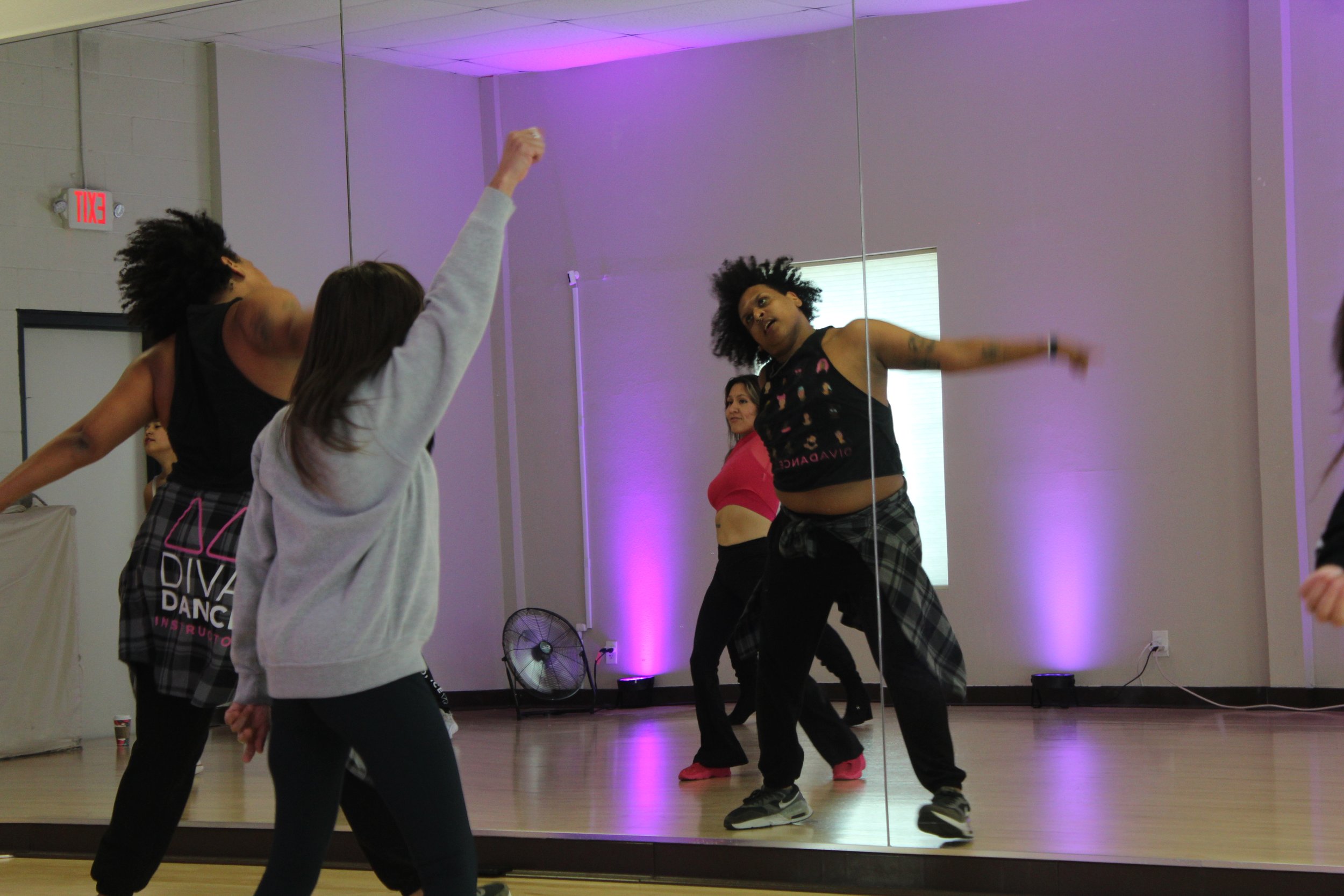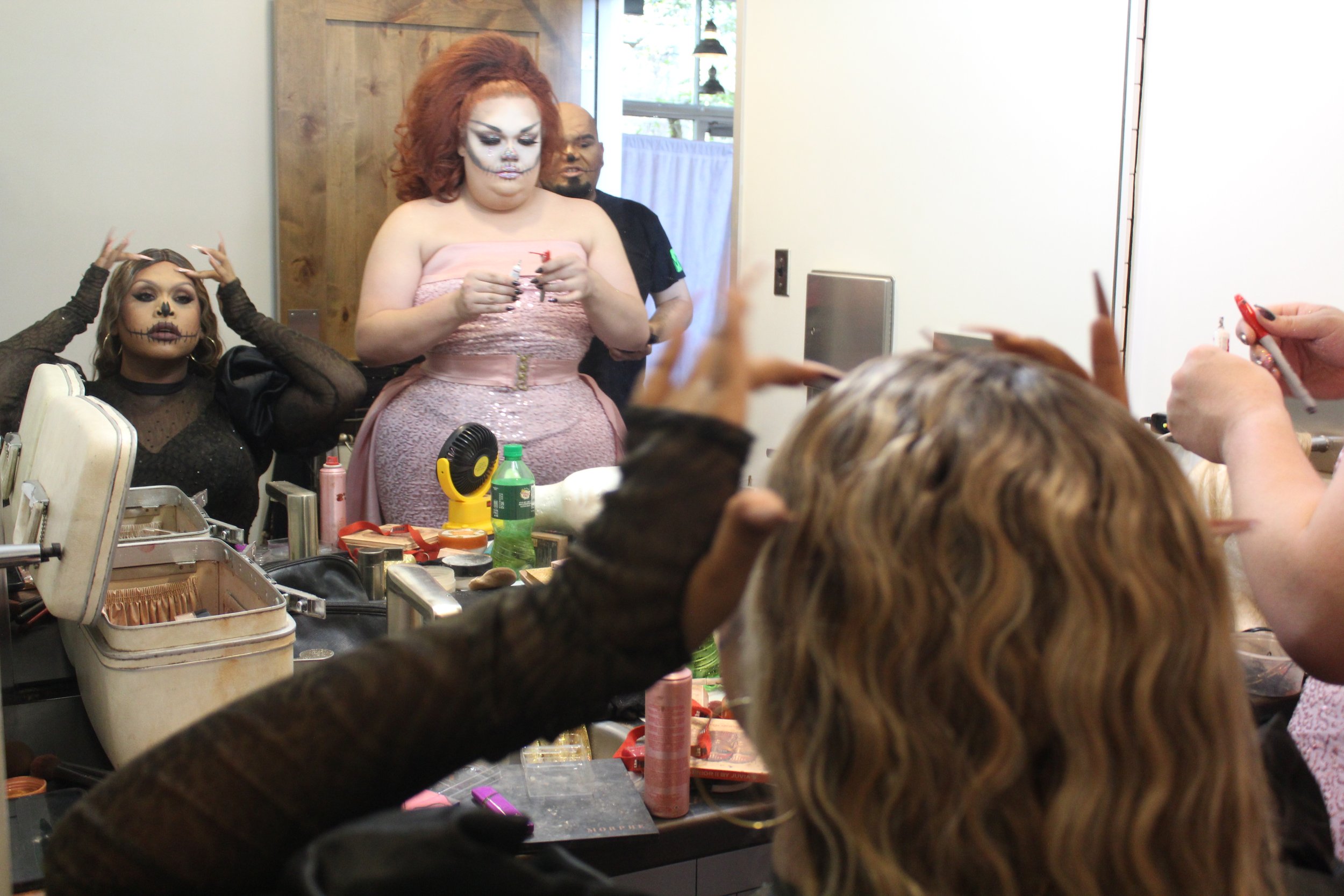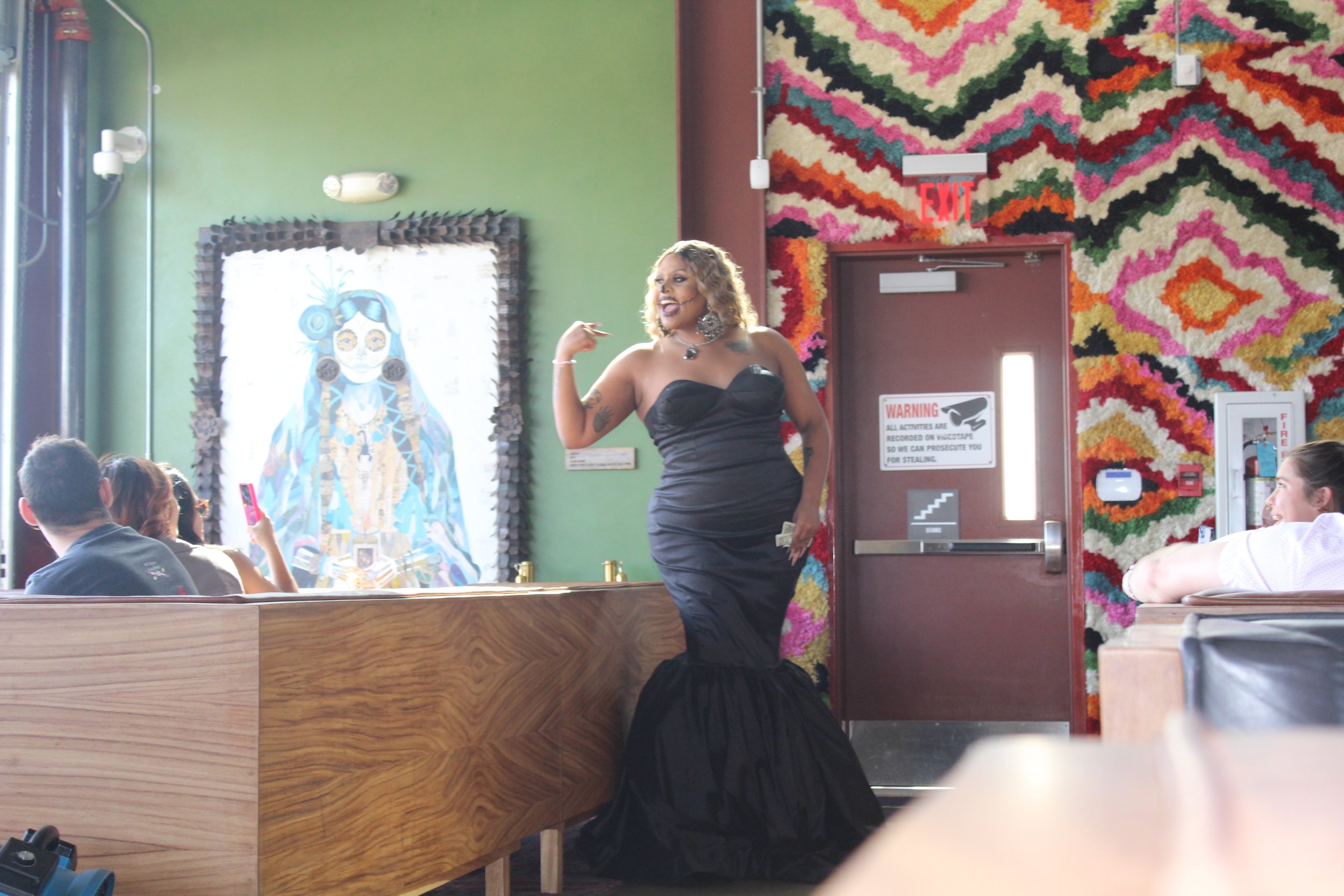NAVIGATING GENDER FLUIDITY: LAWRENCE ACOSTA’S JOURNEY TO SUCCESS AS NATASHA B. CAPRI.
Words and photography by Mariana Cid de León Ovalle
Just before noon, I step into Diva Dance's bustling studio, greeted by the vibrant energy that envelops Lawrence. As the 26-year-old dance instructor, also known as Natasha B. Capri, kicks off the class, urging everyone to stay hydrated, his humor shines through: "Seriously, y’all. Do not pass out for Camila Cabello." The room erupts in laughter. Lawrence, with his authentic spirit, community focus, self-awareness, and zest for life, embodies what Diva Dance aims to foster and punctuates my love for this growing community. Constantly straddling the line between feminine and masculine, he boldly challenges gender norms, captivating attention with his sharp wit and defiant attitude.
Lawrence Acosta was born in Downingtown, Pennsylvania, and grew up in a small town near Amish country to a 23-year-old single Black mother and a Hispanic father who spent most of his time on the road as a truck driver. He and I sat down after dance class to chat about his life there, which he described as peaceful but also “a bit of a blur,” and how everything changed in fourth grade after moving to Texas. In fifth grade, his audition for a school talent show led to a traumatizing encounter with fatphobia. “It was a very private audition with just the music teacher and me. I remember her loving it. I was a big kid, though. I saw a group of students watching me through a small window, and I will never forget one girl laughing at me.” In a quintessentially Lawrence move, he honed the power of his community by unknowingly flirting with what would one day become his profession. “I decided to put together a dance to “Shake it” by Metro Station, which is a very inappropriate song for fifth graders to dance to. I taught it to all the other kids on the playground, and we performed it together.”
Leaving Pennsylvania also opened Lawrence’s world to exploring his sexuality and gender expression. In middle school, teachers began describing him as someone who transcends gender. It’s something that hasn’t changed much to this day. (When asked about which pronouns are preferred, he simply replies “yes,” before clarifying that as long as he’s not in drag, I can refer to him by whichever pronoun.) In 7th grade, he came out to his mom. “I told her that I was bisexual. She said, ‘Yeah, I know,’ and that was the end of the conversation.” Lawrence would go on to have several girlfriends before realizing he was not bisexual but gay, and through it all, his mom’s support never wavered. “She gave me a lot of insight after I came out and was able to support me and be the support that she had.” Lawrence’s maternal great-uncle Mack, an openly gay man, helped his mom find her style and taught her how to hone confidence when fatphobia left her feeling alienated from their family.
Lawrence's resilience shines in his sharp humor, forged in the battles of his youth. At 18, grappling with gender identity, he humorously recalls a midnight head-shaving episode, envisioning it as a movie scene. "If I had played 'Pretty Hurts' during that moment," he quips, "it could have been a movie," punctuated with a sardonic trademark shoulder shimmy. Returning to school with a shaved head felt empowering, but as time passed, he embraced hair extensions, makeup, and a femme presentation again. The journey to find a comfortable gender expression led Lawrence to the world of Drag performance, where he discovered the ability to channel his feminine energy while retaining his identity.
Lawrence's early struggles with disordered eating, starting in 7th grade, posed familiar challenges upon entering the drag world. Reflecting on this, he notes, "Some girls will do anything to fit into the smallest outfits." Acknowledging his past, he admits to overcoming similar challenges in his early 20s. At 26, Lawrence incorporates lessons from his journey into maintaining a healthy relationship with his body. With a confident shoulder shimmy, he emphasizes, "I’m nicer to myself now; I enjoy being healthy. There's nothing wrong with eating food. There's nothing wrong with having a little jiggle." This triumph over adversity in his youth has become one of Lawrence's most potent strengths. On our second day, we visit Lawrence's home, sipping coffee and chatting as he readies for work. I anticipated the transformation from Lawrence to Natasha would feel gradual, yet at this moment I realize Natasha is ever-present. Their profound respect for women is also ever-present, embodied in the origin of Natasha's name. "Natasha" pays homage to Lawrence's last girlfriend, Natasha Harper, showcasing not just their sentimentality, but their humor, too. The "B" in her name references her former Drag name, "Natasha Bendanfeel," which evolved after a conversation with the late Sweet Savage, a cherished mentor and beloved Drag queen. Recalling Savage's wisdom, Natasha shares, "She said, 'You're pretty. You're talented. Why do you have such a stupid name?'" She recalls this fondly because it was so typical of Sweet Savage, a woman who Lawrence regards as a crucial figure to his Drag journey, highlighting his appreciation for the women who shaped Natasha's identity.
Then she reveals that "Capri" honors her mother's maiden name, underscoring the meaningful choices in her career. Every detail in Natasha's persona is purposeful, a canvas of bold self-expression embodying the love and support of influential women. Recounting her first competition, Natasha shares, “The night before...my mom gave me a bra, my aunt gave me a wig, and my grandma - a breast cancer survivor - gave me some of her fake breast inserts.” Even now, her mother crafts a Renaissance Tour-themed costume for Natasha's upcoming Beyoncé performance, a testament to their enduring relationship.
It’s close to showtime when Natasha and I arrive at Paramour at the Phipps in downtown San Antonio, where she has performed for the last six years, making Natasha the bar’s longest-running resident performer. Kristi Waters, resident host, and San Antonio’s Best Drag Performer for 4 years running, is in full business mode but doesn’t miss a beat when she sees us. In a playful exchange, Kristi teases Natasha for being late, and Natasha fires back with witty comebacks, setting the tone for the vibrant performances ahead.
It takes a lot of mental strength to be naturally funny, and it doesn’t escape me that two of the city’s best drag performers make it look as easy as breathing. As she enters the dressing rooms, Natasha trades outfits and accessories with the other performers; they are, in many ways, a family. Introducing me to Mehgan Iman Deluxe, her drag sister, Natasha playfully notes that "she puts the 'Meh' in Mehgan," ensuring I recall the spelling. Their chemistry mirrors that of sisters, marked by profound love, loyalty, and familiarity. As longstanding resident performers at Paramour and Bonham Exchange, Natasha and Mehgan navigate the intricacies of the drag world as a formidable duo.
The day before, Natasha explained that if someone calls her 'Lawrence' while she's in drag, she doesn't make a fuss because she knows it's not malicious. I was confident it wouldn't happen to me, but the next day proved otherwise. Picture having the full attention of two top Drag performers, only to unintentionally give them fodder for hilarious roasting. Though I missed Mehgan Deluxe and Ira Descent on stage, mistakenly referring to Natasha by her government name in front of them put me in the spotlight for their quick, sharp, and humorous banter.
Natasha took it in stride, but she wasn’t always that way. Her humor and ability to fight back with her words developed in middle school. It’s because she is the total opposite now, handling these moments with an impervious demeanor that I’m driven to ask how she manages situations where someone is being intentionally negative or downright hateful. “Typically, it's never about the person they're fighting with. It's usually something deeper. I feel that most people who are, in a sense, hard on themselves, or even shitty people, didn't have a chance to be nicer to their inner child.” That’s when it strikes me that Natasha is wise beyond her years. She has a strong grip on how to nurture and heal her inner child, on how to practice empathy, and she knows how to distance herself from things that don’t serve her. By opting not to host shows extensively to allow time for decompression, and refusing to internalize the negativity of others, she demonstrates a deep sense of self-awareness and self-worth. It’s a testament to her true nature, that of a fighter and a survivor.
The sun doubles as a spotlight as it streams through the windows of the rooftop floor at Paramour while Natasha performs her final number, donning a black floor-length gown and long blonde hair that accentuates her face, swaying along her backside when she walks. “Are y’all ready for some karaoke?” She adds after finishing her performance. As Natasha belts out the first few lines to Joshua Turner’s “Your Man” with her deep-bass baritone, the audience has no choice but to eat it up, and they do. It hits me that I’ve gotten to know her well enough in the last two days that I understand the meaning beyond the bit. This is her everyday experience. Lawrence and Natasha are more of a duet than they are two sides of the same coin, from her cheeky shoulder shimmies to his propensity for naughtiness, Natasha is as present in Lawrence’s body as he is. Beyond that, Natasha serves as an outlet through which Lawrence channels confidence and strength, while Lawrence, in turn, possesses a solid foundation of resilience and determination, allowing Natasha to find her voice. They are the same entity, and every achievement has empowered them to transform their dance between gender expectations into a successful career■





